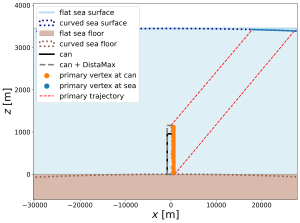23 November 2024 – In a new paper with the title ‘gSeaGen code by KM3NeT: an efficient tool to propagate muons simulated with CORSIKA’ we describe an open source solution for efficient simulation of cosmic-ray induced muons in neutrino telescopes.
For this, we adapted the gSeaGen code, which generates high statistic samples of simulated neutrino-induced events, detectable by neutrino telescopes.
Updated gSeaGen can now also process muons from cosmic-ray induced particle showers in the atmosphere, which are generated by the Monte Carlo simulation code CORSIKA.
The tracking of muons towards the simulated detector offers efficient re-use of the particle shower when a muon misses the detector. We added several other new functionalities for computational efficiency and user control.
We updated gSeaGen with KM3NeT in mind, but other under-ground, under-water, or under-ice experiments may profit from it as well.
The paper is submitted to Computer Physics Communications
A preprint is available at: https://arxiv.org/abs/2410.24115
In the image:
Sketch of the projection of the side area of the detector (the ‘can’) onto the sea surface.


